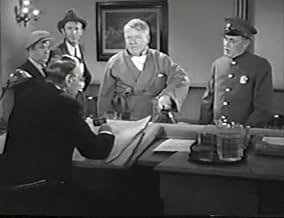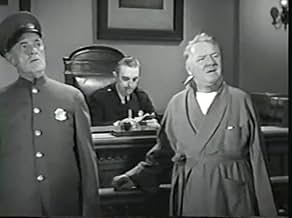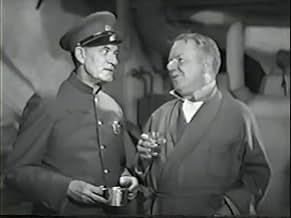IMDb RATING
7.4/10
1.4K
YOUR RATING
Hard-working, henpecked Ambrose Wolfinger takes off from work to go to a wrestling match with catastrophic consequences.Hard-working, henpecked Ambrose Wolfinger takes off from work to go to a wrestling match with catastrophic consequences.Hard-working, henpecked Ambrose Wolfinger takes off from work to go to a wrestling match with catastrophic consequences.
Arthur Aylesworth
- Night Court Judge
- (uncredited)
Jack Baxley
- Court Officer
- (uncredited)
Mickey Bennett
- Office Employee
- (uncredited)
Billy Bletcher
- Timekeeper
- (uncredited)
Harry C. Bradley
- Passing Motorist
- (uncredited)
Featured reviews
Something's amiss if I'm posting the first and only comment on this important Fields comedy, and I think I know what it is: none of his mid-30s Paramount triumphs are available for viewing! Videotapes of Fields films ca. 1932-6 are seemingly nonexistent, and they're never on television (cah-mon, Turner Classic Movies, look alive here!) End result: many thousands of younger viewers -some of 'em already fans of 30s movies- are being cheated of their comedy birthright. (Of course, his later and equally-funny Universal jobs are readily available - witness the ever-spiraling reputation of THE BANK DICK, for starters.) And you can sing THE BANK DICK's praises morning, noon and night and get nothing but 'amens' from me, but a case can be made for mid-30s Fields-at-Paramount as his best and most fertile period, and TRAPEZE -which came at the end of that run- embodies every virtue inherent in the Great Man's work. When a Fields movie fires on all cylinders, it should almost seem a throwaway: meandering plot, disconnected bits of old vaudeville, sitcom surrealism and Falstaffian braggadocio loosely strung together with a nonchalant mean streak adding the sting in the tail. (Certainly, every fan of FAWLTY TOWERS needs to see this one!) Here, he plays Ambrose Wolfinger, a man as put-upon and abused in his fruitless search for middle-class contentment as BRINGING UP FATHER's Jiggs (complete with his very own harridan Maggie, played here by Kathleen Howard, whose baleful countenance could've cowed Groucho into meek silence!) The plot revolves around Fields' doomed attempts to sneak away from work to see his favorite wrestler, the aforementioned Mr. Mishabob, with neither his boss nor his wife ever being the wiser. That's it; that's the plot, thin enough to be rejected for an episode of LIFE OF RILEY. And as usual with Fields, this ludicrously threadbare conflict is the essence of his art, as we watch this browbeaten fellow struggle to maintain a sense of decorum as everyone and everything in his universe conspires to crush, defeat and deny him this one simple desire, with hilarious results. (Well, I told you about that mean streak, right?) The beauty of Fields and TRAPEZE is that, though he's essentially a small, petty, unlikable prig, everyone AROUND him is a thousand times worse - so horrid and poisonous that he becomes sympathetic and even heroic by comparison (with the exception of the one pearl of sentiment he allowed himself, the loving and understanding daughter who defends him by allowing him to think she needs HIS protection). There aren't very many comedies that deliver such richness of pleasure from such skeletal premises: in fact, most of them were made by Fields. Will someone please revive this gem before the last print falls to dust?
Comedy is funny. I mean that it is odd in addition to being amusing. You can laugh and also wonder about why and maybe even laugh at that.
Film comedy is different than other comedy, say written comedy.
My own notions of film are that everything essential was worked out in the thirties when competing concepts elbowed each other and we ended up with the rough cinematic vocabulary we have now. Nowhere is this more true than with straight humor.
Since that time, we've developed a complex notion of the humors of irony, but what I'm talking about here is people directly depicting funny stuff.
So when you go back, you find a few innovators, something like the few jazz inventors of the 50s. What they did is pure by retrospective definition. Going back helps you discover yourself: are you a Keaton man? Chaplin, Arbuckle, Marx, Laurel?
W C Fields is one that you should experience. I liked his "Sucker" movie the best because it was his last and most mature; and the story dealt with him as Fields and the studios telling him he wasn't funny.
Here is his best early film where he does his thing. It is in the vaudeville tradition of being a bunch of loosely connected skits. But it is highly cinematic humor, just not the sight gags you see with the others. It depends all on timing.
The first sequence is the best. Our man is preparing for bed. He sneaks drinks while his witchy wife complains (in a separate bed, as this is post-code). The key joke here is him taking his socks off.
If you haven't seen it, I know this sounds odd, but Fields taking his socks off is hilarious. It takes forever. Then they hear intruders below and he puts his socks back on, taking almost as long. It is a truly precious lesson in investing in laughter. It isn't explosive. It isn't particularly subtle or clever. It is just reality bent in a complex rubato that we have to take the time to relish.
Terrific. I watched that one scene several times.
Ted's Evaluation -- 3 of 3: Worth watching.
Film comedy is different than other comedy, say written comedy.
My own notions of film are that everything essential was worked out in the thirties when competing concepts elbowed each other and we ended up with the rough cinematic vocabulary we have now. Nowhere is this more true than with straight humor.
Since that time, we've developed a complex notion of the humors of irony, but what I'm talking about here is people directly depicting funny stuff.
So when you go back, you find a few innovators, something like the few jazz inventors of the 50s. What they did is pure by retrospective definition. Going back helps you discover yourself: are you a Keaton man? Chaplin, Arbuckle, Marx, Laurel?
W C Fields is one that you should experience. I liked his "Sucker" movie the best because it was his last and most mature; and the story dealt with him as Fields and the studios telling him he wasn't funny.
Here is his best early film where he does his thing. It is in the vaudeville tradition of being a bunch of loosely connected skits. But it is highly cinematic humor, just not the sight gags you see with the others. It depends all on timing.
The first sequence is the best. Our man is preparing for bed. He sneaks drinks while his witchy wife complains (in a separate bed, as this is post-code). The key joke here is him taking his socks off.
If you haven't seen it, I know this sounds odd, but Fields taking his socks off is hilarious. It takes forever. Then they hear intruders below and he puts his socks back on, taking almost as long. It is a truly precious lesson in investing in laughter. It isn't explosive. It isn't particularly subtle or clever. It is just reality bent in a complex rubato that we have to take the time to relish.
Terrific. I watched that one scene several times.
Ted's Evaluation -- 3 of 3: Worth watching.
10pwp1000
I agree with Fowler of Metarie. This is one of W. C. Fields classic masterpieces. It is certainly on a par with the available later films such as "The Bank Dick" and "Its a Gift". It is a shame that this film isn't available on commercial video.
The scene where W. C.'s character in sent, unwillingly, to investigate the, "burglars singing in the cellar", is one of the funniest on film. He encounters the burglars, including a young Walter Brennan with hair, in the cellar with his friends stealing W. C.'s illegal cider and singing. W. C. admires the singing and enters into the festivities. This scene, from the point where he is browbeaten into going down to check the cellar, to the point point where he is arrested by the investigating cops for making cider without a license, is comparable to anything on film, including the famous "and-a two hard boiled eggs," scene from the Marx Brothers, "Night at the Opera", or Fields own back porch scene from "Its a Gift".
I remember seeing this film broadcast about twenty years ago. I have looked to no avail for it to be rebroadcast ever since. This is such a good movie it really needs to be available.
The scene where W. C.'s character in sent, unwillingly, to investigate the, "burglars singing in the cellar", is one of the funniest on film. He encounters the burglars, including a young Walter Brennan with hair, in the cellar with his friends stealing W. C.'s illegal cider and singing. W. C. admires the singing and enters into the festivities. This scene, from the point where he is browbeaten into going down to check the cellar, to the point point where he is arrested by the investigating cops for making cider without a license, is comparable to anything on film, including the famous "and-a two hard boiled eggs," scene from the Marx Brothers, "Night at the Opera", or Fields own back porch scene from "Its a Gift".
I remember seeing this film broadcast about twenty years ago. I have looked to no avail for it to be rebroadcast ever since. This is such a good movie it really needs to be available.
This is one film that most W C Fields Fans would want to buy--if it were available on video from Universal, the video source that has the deepest, darkest vaults in the video business. What Universal is not releasing (among many other Fields films) is a saga of Fields in his "Henpecked Husband" role as an office manager who has the answers to everything in the interior of his massive roll top desk. He is unappreciated by his wife, mother-in-law, and do nothing step-son, but loved by his grown daughter--a reoccuring theme in many of his movies. All he wants to do is take the afternoon off to go to the wrestling match, and being a loyal employee who does not want to offend his boss, thinks of an excuse to leave for the day. From here his day goes downhill. Does he ever see the match? Try to turn on the television and see this film, if it ever shows up on the major film "networks". Or, just pray for Universal to release this film on video. It's a great Fields film. Don't miss it if you can!
10Tom-274
Burglars singing in the cellar scene is hysterical. "What are they singing?" Fields asked his distraught wife. The breakfast scene where his wife reads poetry while Fields finds nothing to eat. "And best of all," she declares, "it has no punctuation." Fields in jail with a killer. "I had three wives, and this is the first one I've ever killed." "That's very much in your favor," notes Fields. This film is wonderful. It is a shame it's not available on video.
Did you know
- TriviaThis was the last film directed by Clyde Bruckman. Although Bruckman's name appears on the credit, this film was actually directed by W.C. Fields, who took over after Bruckman had to quit early in the shoot due to the effects of his alcoholism. This is the only film on which Fields technically worked as his own director.
- GoofsMother-in-law Cordelia says "Well he's a fiend, a wool in sheep's clothing" ... Leona Wolfinger immediately catching the error says "What?" and immediately Cordelia corrects herself "A wolf in sheep's clothing ..." and the scene continues as if no error occurs; a great recovery.
- Quotes
Ambrose Wolfinger: My poor mother-in-law died three days ago. I'm attending her funeral this afternoon.
Ambrose's Secretary: Isn't that terrible, Mr. Wolfinger!
Ambrose Wolfinger: Yes, it's terrible. It's awful. Horrible tragedy.
Ambrose's Secretary: It must be hard to lose your mother-in-law.
Ambrose Wolfinger: Yes it is, very hard. It's almost impossible.
- ConnectionsFeatured in W.C. Fields: Straight Up (1986)
- SoundtracksOn the Banks of the Wabash, Far Away
(1897) (uncredited)
Music and lyrics by Paul Dresser
Sung a cappella by W.C. Fields, Walter Brennan, Tammany Young and Lew Kelly
- How long is Man on the Flying Trapeze?Powered by Alexa
Details
- Release date
- Country of origin
- Language
- Also known as
- Everything Happens at Once
- Filming locations
- Production company
- See more company credits at IMDbPro
- Runtime
- 1h 6m(66 min)
- Color
- Aspect ratio
- 1.37 : 1
Contribute to this page
Suggest an edit or add missing content








































